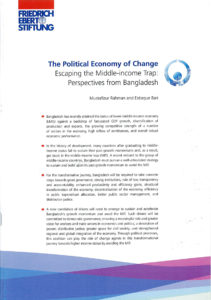 Bangladesh has recently attained the status of lower middle-income economy (LMIE) against a backdrop of fast-paced GDP growth, diversification of production exports, the growing competitive strength of a number of sectors in the economy, high inflow of remittances, and overall robust economic performance. In the history of development, many countries after graduating to middle-income status fail to sustain their past growth momentums, and, as a result, get stuck in the middle income trap (MIT). A recent entrant to the group of middle income countries, Bangladesh must pursue a well-articulated strategy to sustain and build upon its past growth momentum to avoid the MIT. For the transformative journey, Bangladesh will be required to take concrete steps towards good governance, strong institutions, rule of law, transparency and accountability, enhanced productivity and efficiency gains, structural transformation of economy, decentralization of economy, efficiency in public expenditure allocation, better public sector management and distributive justice.
Bangladesh has recently attained the status of lower middle-income economy (LMIE) against a backdrop of fast-paced GDP growth, diversification of production exports, the growing competitive strength of a number of sectors in the economy, high inflow of remittances, and overall robust economic performance. In the history of development, many countries after graduating to middle-income status fail to sustain their past growth momentums, and, as a result, get stuck in the middle income trap (MIT). A recent entrant to the group of middle income countries, Bangladesh must pursue a well-articulated strategy to sustain and build upon its past growth momentum to avoid the MIT. For the transformative journey, Bangladesh will be required to take concrete steps towards good governance, strong institutions, rule of law, transparency and accountability, enhanced productivity and efficiency gains, structural transformation of economy, decentralization of economy, efficiency in public expenditure allocation, better public sector management and distributive justice.
In view of this, the Centre for Policy Dialogue (CPD), in partnership with the Friedrich-Ebert-Stiftung Bangladesh Office prepared a report titled The Political Economy of Change- Escaping the Middle-income Trap: Perspective from Bangladesh. The report is authored by Professor Mustafizur Rahman, Executive Director, and Mr Estiaque Bari, Research associate, of CPD.
Publisher:Friedrich-Ebert-Stiftung Bangladesh Office
ISBN: 978-984-34-1245-4 (English version)
ISBN: 978-984-34-2155-5 (Bangla version)

